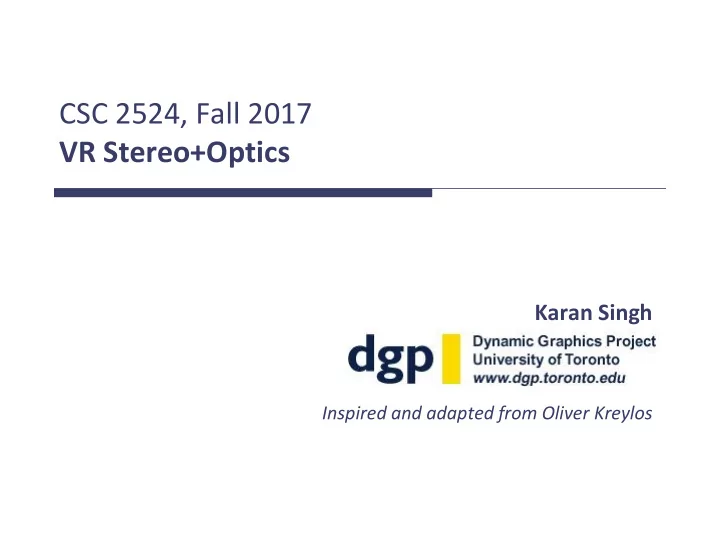

CSC 2524, Fall 2017 VR Stereo+Optics Karan Singh Inspired and adapted from Oliver Kreylos
Outline Real-world visual perception. ● how VR emulates it. ● Problems and consequences of the emulation in VR. ●
Vision
Vision
Vision in Room VR
Vision in Room VR
Vision in Room VR
Vision in Room VR
Vision in Room VR
User Movement
Vision in Room VR
Vision in Room VR
Vision in VR
Vision in Room VR
Vision in Room VR
Vision in Room VR
Head-Mounted Displays
Head-mounted Displays
Head-mounted Displays
Head-mounted Displays
Optics
Accommodation …eye lens changes shape “ accomodates ” to focus at different depths.
HMD Optics
HMD Optics
HMD Optics
Head-mounted Displays
Head-mounted Displays
Lens Distortion
Lens Distortion
Lens Correction
Configuration
Configuration
Physiognomy
Configuration
Configuration
Configuration
How to measure your IPD
Mis-configuration
Mis-configuration
Mis-configuration
Mis-configuration (depth inaccuracy)
What VR Needs Good screens and lenses ● Good internal calibration ● High-precision head tracking ● Good user calibration ● Ideally eye tracking ● Low end-to-end latency ●
End-to-end Latency
End-to-end Latency
End-to-end Latency
End-to-end Latency
What Else Can Go Wrong? Artificial locomotion ● Mismatch between “seen” and “felt” motion ● Vection-vestibular conflict ●
Accomodation and Vergence Conflict Why do virtual objects close to my face appear blurry when wearing a VR headset? My vision is fine! And why does the real world look strange immediately after a long VR session?
Vergence
Accomodation-Vergence Coupling How do our eyes “accommodate” or determine lens focus? Blurriness reflex. Foveal vision is clearer than peripheral. We have two eyes. => “ vergence ”
A-V Conflict Effects Blurry objects ● Eye strain ● Accommodation-vergence de coupling ● Vision feels “off” for a while after using VR ● Might interfere with vision development in very young children ● Potential solutions: ● Lenses that allow different screen distances. ● True Holographic displays. ●
Projects Tempest projects Storm: fake storm, audience driven. ● idea: estimate audience interest/gaze on stage, by some optical technology. for eg. processing colored ballcaps worn by audience from a camera on the ceiling. or library like densepose. use the estimated attention of lack of to produce glitches in a projected audio-visual storm to convey it is a manufactured storm. http://densepose.org/ Prospero’s brush: tiltBrush for natural phenomena. ● idea: a tilt brush like interface where you paint out a dynamic landscape with trees and waterfalls. For inspiration see https://www.youtube.com/watch?v=uthd5rLJZtg http://www.dgp.toronto.edu/~karan/videos/drive_clip.wmv https://www.youtube.com/watch?v=TckqNdrdbgk https://www.youtube.com/watch?v=GSbkn6mCfXE https://www.youtube.com/watch?time_continue=7&v=qj2XxB2dsco Ariel ’ magic: Projective painting in real -time. ● idea: have a user view their environment via a 360 camera that they are able to overlay drawings on a tablet. The drawings are projected back onto the environment in real-time. https://www.youtube.com/watch?v=KYKyqCsmMAU Drawing on surfaces in AR/VR • idea: drawing on an object in 2D is best handled by projecting the sketched 2D points onto the visible objects through the screen. The best way to project an in-air 3D stroke on to 3D objects is not known. A good technique needs to be both intuitive and provide instant feedback so that a user is able correctly produce the on-surface strokes they desire. We already have a working prototype for this. The prototype will need to be improved and tested for usability using the vive in VR. https://www.youtube.com/watch?v=PSD_nISLolY https://www.youtube.com/watch?v=vBos8A_cwSM
Projects Facial Animation in VR • idea: use voice and hand gestures to control an animated face in VR. http://jaliresearch.com/ Proprioceptive interfaces in AR/VR. ● idea: perform a study to understand human proprioceptive zones and design an interface of menus and commands to exploit the zones. Pointing in AR/VR (mirror pointing). ● idea: perform a study to understand human pointing at targets and build a data-driven model to predict pointed targets. Interactive 3D acquisition and scanning of large spaces with AR ● idea: create a gestural interface to create a 3D model of spaces using AR/VR https://www.youtube.com/watch?v=Xnp3_eMYXj0 Direct manipulation, browsing of linked 360 images and video. • idea: given a number of 360 images of spaces with common features, create a system that allows a user to browse the collection using familiar mobile hand gestures. As an example here are some 360 images, that are not spatially collocated but shown as hotspots that you can use gaze to switch between http://demos.janusvr.com/karan/webvr/hotspots/
Projects Developing a cinematic vocabulary for 360 video in VR. (shots/cuts/staging). • idea: adapt ideas from 2D cinematography to drive user gaze in 360 video. Augmented Reality for Dance Choreography (with National Ballet). ● idea: take clips or key points of dance choreography that can be overlaid live and controlled by a dancer while dancing. Guided Tours in VR. ● idea: design a system to allow the creation of bots, that are able to guide users through a VR environment. The bot needs to be able to pause the tour based on user interest and focus, the user can choose to leave, join and catch-up with the tour, as well as choose between tours. Immersive platform for language and cultural exchange. ● idea: the French dept. is interested in creating a restaurant scenario that can be used as a setting for language education.
Recommend
More recommend